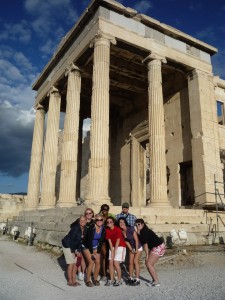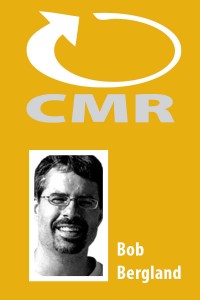Make it a double
By Robert Bergland
While combining reporting and study abroad is an excellent way to enhance students’ skills while increasing their understanding of the world, combining research with study abroad is yet another way to double the educational value of a trip to another country.
 Study abroad and undergraduate research are often considered two separate facets of applied learning. However, they can be very compatible, and combining them can enhance the learning experience for both activities. For the students enrolled in Spring 2010 in Global Journalism Research, a special topics class offered for the first time at Missouri Western State University, that combination led to an experience they will not soon forget. The goals were simple:
Study abroad and undergraduate research are often considered two separate facets of applied learning. However, they can be very compatible, and combining them can enhance the learning experience for both activities. For the students enrolled in Spring 2010 in Global Journalism Research, a special topics class offered for the first time at Missouri Western State University, that combination led to an experience they will not soon forget. The goals were simple:
- to expose students to media systems in other countries
- to teach students about mass communication research methods
- to have students undertake full-fledged, publishable-quality research projects
- to have as many students as possible present their research findings at an international conference
 Eight of the students in the class were able to accomplish this last goal by submitting successful abstracts and presenting at two conferences. The students went on a 17-day trip to Europe right after the end of the spring semester, a trip that combined fun, learning and the presentation of their research projects completed in the Global Journalism Research course. Two groups of two students had used the Newseum site for their research, with one group comparing celebrity coverage of U.S. vs world newspapers, while another group compared front page advertisement size, number and placement on U.S. vs European newspapers. They presented at the International Mass Media Conference in Athens, Greece, along with another student with Spanish skills who studied 35 website features of newspapers in Spain. Two other students, conducting similar newspaper website studies of dailies in France and Australia/New Zealand, presented their research at the Information Technology and Journalism conference, held a week later in Dubrovnik, Croatia. The eighth student, also presenting in Dubrovnik, had conducted an ethnographic study at a local newspaper, examining the training and incentives (or lack thereof) for the reporters and photographers to do multimedia work.
Eight of the students in the class were able to accomplish this last goal by submitting successful abstracts and presenting at two conferences. The students went on a 17-day trip to Europe right after the end of the spring semester, a trip that combined fun, learning and the presentation of their research projects completed in the Global Journalism Research course. Two groups of two students had used the Newseum site for their research, with one group comparing celebrity coverage of U.S. vs world newspapers, while another group compared front page advertisement size, number and placement on U.S. vs European newspapers. They presented at the International Mass Media Conference in Athens, Greece, along with another student with Spanish skills who studied 35 website features of newspapers in Spain. Two other students, conducting similar newspaper website studies of dailies in France and Australia/New Zealand, presented their research at the Information Technology and Journalism conference, held a week later in Dubrovnik, Croatia. The eighth student, also presenting in Dubrovnik, had conducted an ethnographic study at a local newspaper, examining the training and incentives (or lack thereof) for the reporters and photographers to do multimedia work.
The trip had many benefits. As with all study abroad trips, the simple act of seeing other countries and historical sites was a valuable learning experience in and of itself. Students were able to visit sites in not only Greece and Croatia, but also Italy (since there’s no direct route from Athens to Dubrovnik, a route through Rome and Venice was met with nary an objection). And, since it was cheapest to fly to London and use discount airlines to get to Athens and from Dubrovnik, it would have been a shame not to stop over in London for a few days to see museums, Stonehenge and Bath and take in a play at the Globe Theatre.
The conferences were triply beneficial in terms of education. For one, presenting at an international conference was a very positive—if sometimes nerve-wracking—experience. The fact that their research and quality of their presentations was on par with most all of the other ones on the program did much to build the students’ confidence and self-esteem. Second, the chance to attend many of the other sessions on international mass media and journalism was something they could never replicate in the classroom. Finally, the ability to put presenting at an international conference on a resume and/or graduate school application opened many doors and has been a great conversation starter in their job/graduate school interviews.
Perhaps the most educational experience, though, came in talking with other presenters, journalists and citizens of other countries. Those opportunities taught them more about those countries and other people than any book ever could. And, as many of their post-trip essays revealed, those interactions helped them learn and understand a great deal more about both their own country—and themselves.
One last side benefit: Combining the study abroad experience with the presentation of research had a great financial upside as well. As is likely the case at many schools, the university sets aside money to support students who present at state, national and international conferences. After the students tapped into both those funds and some study abroad scholarships, they were able to reduce the cost of the four-country, 17-day trip to under $2,000. That figure helped increase the number of students who were able to go on what turned out to be a priceless experience.
